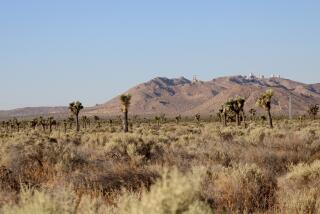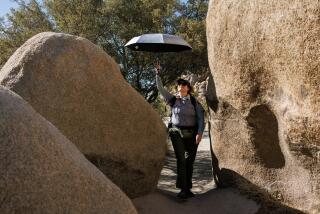Challenges for park rangers
Re “Lone rangers in a hostile land,” Sept. 25
The description of the methamphetamine labs and train robbers in Mojave National Preserve was entertaining -- and troubling. The National Parks Conservation Assn. salutes The Times for highlighting some of the challenges this park faces.
We would also like to add a few facts: The preserve was established to protect a unique cultural and natural landscape for the American people, and it allows us all to experience singing sand dunes, rock art sites that date back 8,000 years, the world’s largest and densest Joshua tree forest and wild animals such as desert tortoises, Mojave fringe-toed lizards, prairie falcons, mountain lions, California condors and desert bighorn sheep.
At nearly 1.7 million acres, the Mojave National Preserve is the third-largest U.S. National Park Service unit outside of Alaska. The fact that only eight law enforcement rangers can be employed to patrol this remarkable preserve is a troubling reflection of an overall lack of sufficient funding of our national park system.
Our national parks currently suffer from an annual operating shortfall of about $750 million, in addition to a massive, multibillion-dollar maintenance backlog. Our association encourages full funding of the Mojave National Preserve and all of our national parks, so that when we bring our families to visit these special places, we are all able to safely enjoy our remarkable natural and cultural heritage.
Mike Cipra
Joshua Tree
The writer is California desert program manager, National Parks Conservation Assn.
In late October 2000, my husband and I were attempting to fly home in our Cessna to L.A. from a vacation at Lake Powell, Utah.
After landing temporarily at Grand Canyon West because of poor weather, we resumed our journey over the desert. Suddenly the clouds dropped down in front of us, and we had to make a quick turnaround. We decided to land on a long stretch of road and pulled off, waiting for the weather to improve.
After 30 minutes, one truck drove by, its passengers obviously surprised to see an airplane. We gave them the thumbs-up, and they left. Ten minutes later, two SUVs came speeding up behind us, the drivers slammed on their brakes and several rangers jumped out, guns drawn.
After showing them our IDs and allowing them to examine our baggage, they realized we were not drug runners. They then expected the FAA to confiscate our plane (it’s normally illegal to land in a national park), but the FAA said that because it was obviously a weather emergency and we had injured no one and damaged nothing, we had committed no crime. At that point the rangers relaxed.
They gave us water, exchanged stories and offered to take us to a hotel. Although the weather was scheduled
to improve soon thereafter, they promised to come
back and check on us again before dark, in case we were still stuck. An hour later the weather did improve, and
we finished our trip uneventfully.
Meeting the rangers brought home to me just how incredibly difficult and dangerous their jobs are. My hat is off to all of our national park rangers.
Crista Worthy
Los Angeles
More to Read
Sign up for The Wild
We’ll help you find the best places to hike, bike and run, as well as the perfect silent spots for meditation and yoga.
You may occasionally receive promotional content from the Los Angeles Times.






